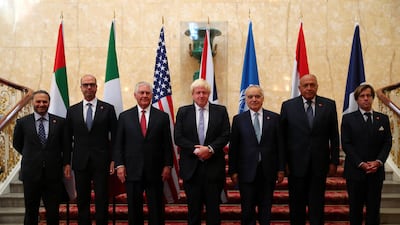American and European governments backed efforts by the United Nations to forge unity among Libya’s competing factions at a London summit attended by Rex Tillerson, the US secretary of state, on Thursday.
Ghassan Salame, the UN envoy who has been appointed to broker negotiations in Libya, reviewed his plans to take forward the Libya Political Agreement (LPA), which he is due to present in New York next week.
Boris Johnson, the British foreign secretary was the host for the talks in London's Lancaster House. As well as Mr Tillerson and Mr Salame, the talks were attended by Dr Anwar Gargash, the UAE minister of state for Foreign Affairs, Angelino Alfano, the Italian foreign minister, Sameh Shoukry, Egypt’s foreign minister and Nicolas de Rivière, political director of the French foreign ministry, at the talks at Lancaster House.
The LPA is due to expire on Monday and there is a need to break the deadlock while keeping all interested parties from walking away from the table in Salame’s new road map. After separate diplomatic initiatives by France and Italy among the Libyans, the UN is key to aligning international efforts into one framework.
“The US wants new energy and focus to mediation efforts led by the United Nations,” Brian Hook, policy chief of staff with the US state department said. “The big goal of this is to avoid a military solution.”
In July, the UN-backed Government of National Accord headed by Fayez al-Sarraj and the eastern-based army commander Field Marshall Khalifa Haftar committed to a ceasefire and holding elections as soon as possible.
Mr Salame provided a summary of meetings with Libyan political leaders, officials and activists as well as international players figures in Libya. If all goes according to Mr Salame’s plan, the country could be ready to hold elections for president and parliament by 2019.
“Many in Libya, as well as the West, recognise that the LPA must be amended and that Haftar will have to play some role in the country’s future,” said Elissa Miller, non-resident fellow at the Atlantic Council's Rafik Hariri Centre for the Middle East.
While in London Mr Tillerson also discussed recovery efforts in the Caribbean in the aftermath of Hurricane Irma. At a meeting in the prime minister's residence in Downing Street, Theresa May told Mr Tillerson that the 2015 Iranian nuclear deal must be a cornerstone of efforts to prevent Iran acquiring nuclear weapons.


